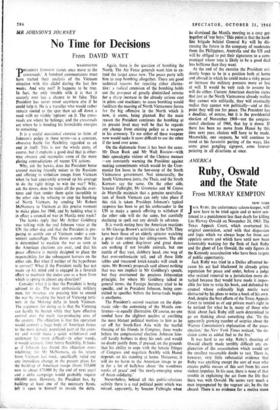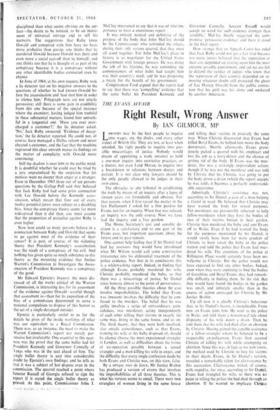Ruby, Oswald and the State
AMERICA
From MURRAY KEMPTON
Jack Ruby was tried in a Dallas affronted be- cause his act had blackened its already grimy reputation for peace and order, before a judge who resisted removal to a jurisdiction more de- tached because that would have made it impos- sible for him to write his book, and defended by counsel whose ordinarily high merits were distracted by his plans to write a book of his own. And, despite the best efforts of the Texas Appeals Court to remind us of any private man's right to be noticed for what he is, many of those who think about Jack Ruby still seem determined to go on thinking about something else. `To the apparently growing number of sceptics about the Warren Commission's eXplanation of the assas- sination,' the New York Times noticed, `the de- cision came as added fuel to the fire.'
It was hard to see why. Ruby's shooting of Oswald clearly made terribly difficult any ex- planation of the assassination which would set the smallest reasonable doubt to rest. There is, however, very little substantial evidence that Ruby was anything except the sort of man who creates public messes of this sort from his own violent impulses. In his case, there is none of that trouble in explaining the act from the life that there was with Oswald. He seems very much a man impregnated by the vagrant air; he fits the absurd. There is no evidence for a motive more
disciplined than what seems obvious on the sur- face—the desire to be noticed, to be an instru- ment of universal outrage aqd to sell his memoirs. The suggestions that Ruby knew Oswald and conspired with him have no basis more probative than gossip; one thinks that he murdered Oswald because Oswald was there and even more a social cast-off than he himself; and one thinks too that he is thought of as part of the conspiracy because it is a conspiracy without any other identifiable bodies connected even by chance.
In June of 1964, at his own request, Ruby took
a lie detector test on his negative answers to the questions of whether he had known Oswald be- fore the assassination and 'had shot him in order to silence him.' Polygraph tests are not utterly persuasive; still there is some gain in credibility from this one because of the special instance where the examiner, having judged him truthful in these substantial matters, found him untruth- ful in a tangential one. 'Have you ever over- charged a customer?,' the lie detector asked. 'No,' Jack Ruby answered. 'Evidence of decep- tion,' the lie detector reported. He could not, of course, have managed a Dallas saloon and never cheated a customer, and the fact that the machine registered this clear untruth makes its findings on the matter of complicity with Oswald more convincing.
Still the shadow is over him in the public mind. It is doubtful whether he could ever be tried by a jury unprejudiced by the suspicion that his motives went no deeper than anger at a stranger. Even in December 1963 three out of ten persons questions by the Gallup Poll said they believed that Jack Ruby had had some prior connection with Lee Oswald before the Kennedy assas- sination, which meant that four out of every twelve potential jurors were subject to a disabling bias. Since the conspiracy theory seems far more widespread than it did then, one must assume that the proportion of prejudice against Ruby is even higher.
Now how could so many persons believe in a connection between Ruby and Oswald that seems to go against most of the evidence of their senses? It is part, of course, of the widening theory that President Kennedy's assassination was the result of a conspiracy of the evil. And nothing has given quite so much substance to this theory as the mounting evidence that Justice Warren's Commission to Investigate the Assas- sination of President Kennedy was a conspiracy of the good.
Mr Edward Epstein's Inquest, the most dis- cussed of all the works critical of the Warren Commission, is interesting less for its assessment of the evidence against Oswald—careful though that assessment is—than for its exposition of the bias of a commission determined to serve a national compulsion to dispose of this horror as the act of a single deranged outsider.
Epstein is particularly useful to us for the details he gives of the inside workings of what was our equivalent to a Royal Commission. There was, as an instance, the need to make the Warren Commission's report not merely per- suasive but irrefutable. One essential to this neat- ness was the proof that the same bullet had hit President Kennedy and Governor Connally of Texas who was in the seat ahead of him. The single bullet theory is cast into considerable doubt by Epstein's own findings; and he tells us that it was a subject of hot dispute even in the commission. The quarrel reached a point where Senator Russell of Georgia refused to sign the report if it stated the single bullet theory as proved. At this point, Commissioner John J.
;, ,t,13 • '
McCloy intervened to say that it was of vital im- portance to have a unanimous report.
It was entirely natural and definitive of the purpose of the body that John McCloy should be the Commissioner who reminded the others, during their only serious quarrel, that they must all stand together. For John McCloy's place in history is as negotiator for the United States Government with foreign powers. He was doing the job of his lifetime; he was reminding the commissioners of what habit had taught him was their country's need; and he was proposing a treaty for the benefit of his government.
Congressman Ford argued that the report had to say that there was 'compelling' evidence that the same bullet hit President Kennedy and Governor Connally. Senator Russell would accept no word for such evidence stronger than 'credible,' McCloy finally suggested the com- promise 'persuasive evidence' and there it stood in the final report.
How strange that an Appeals Court has ruled that Jack Ruby could not get a fair trial because too many jurors believed that the reputation of their city depended on visiting upon him the most extreme possible punishment, and yet we are left to defend the verdict of judges who knew that the reputation of their country depended on re- moving whatever doubt still protected the ghost of Lee Harvey Oswald from the public convic- tion that his guilt was his alone and unshared by another American.



































 Previous page
Previous page